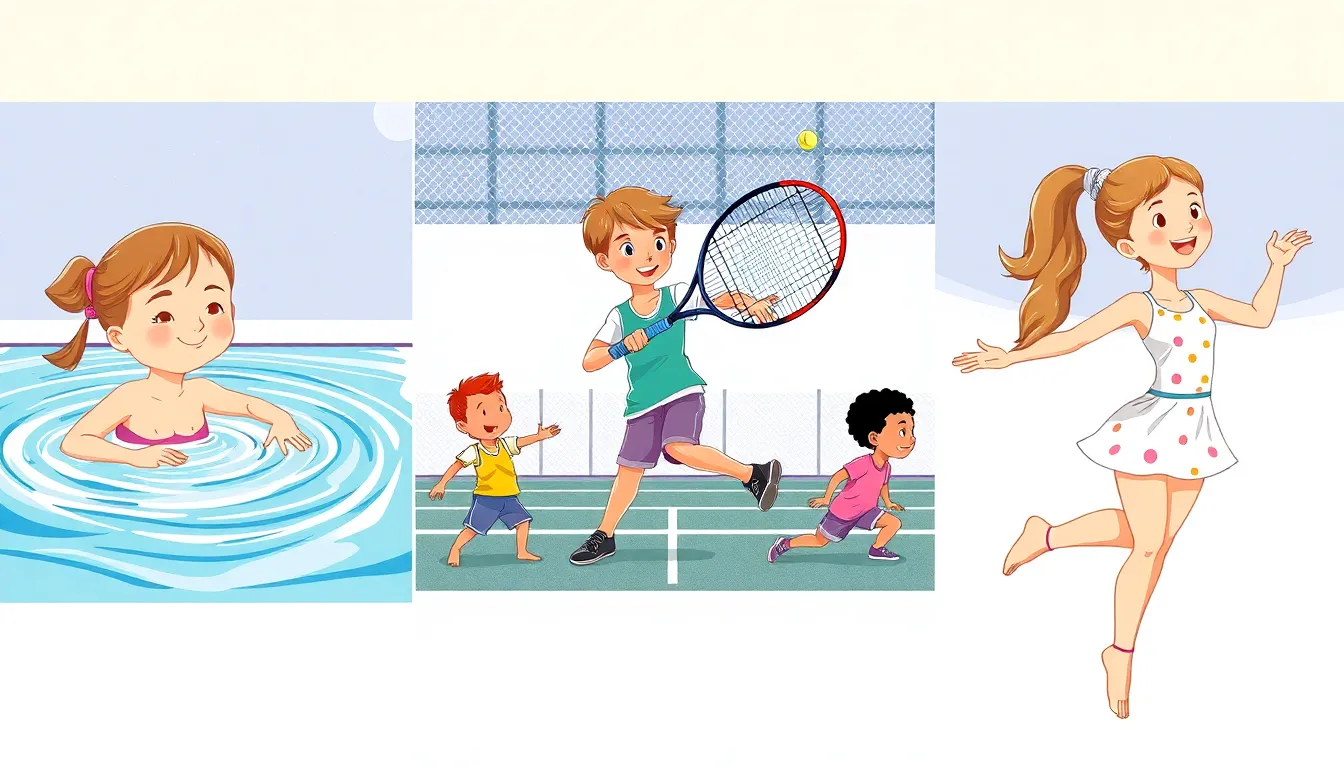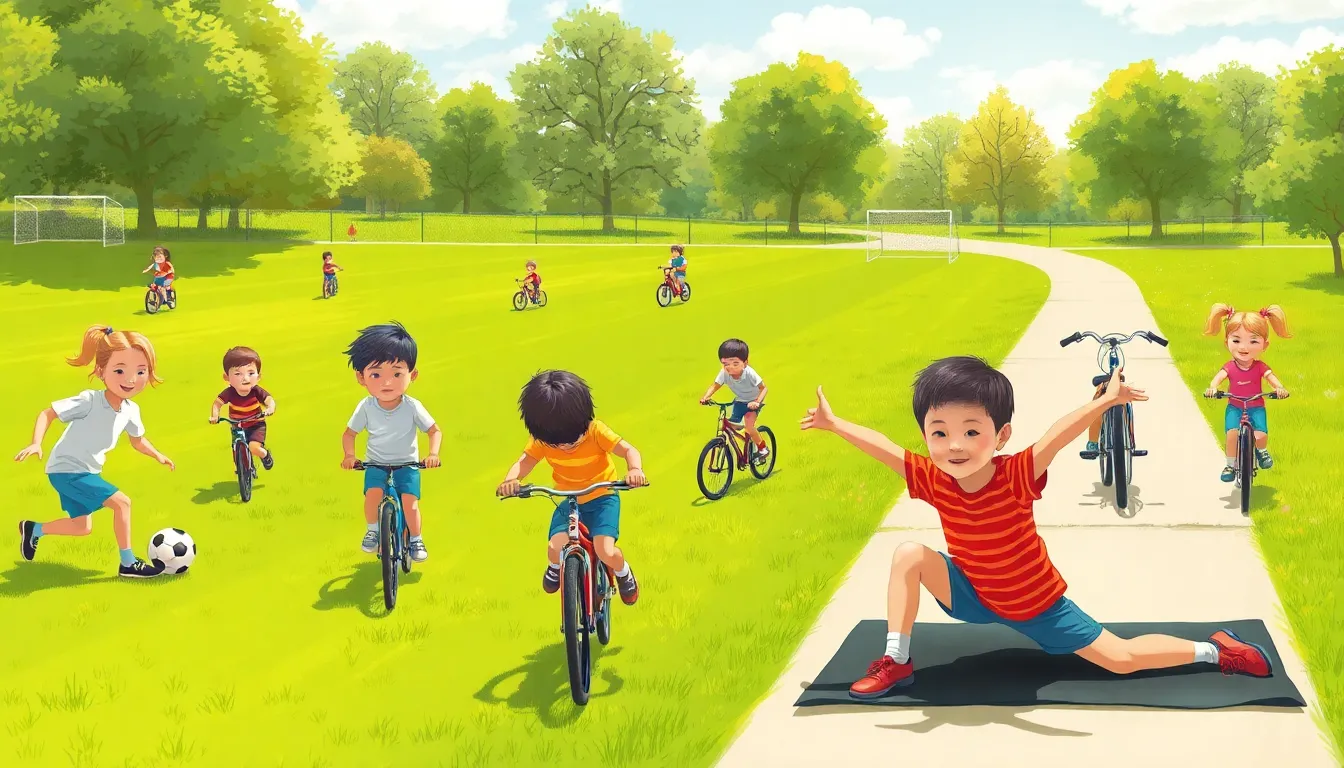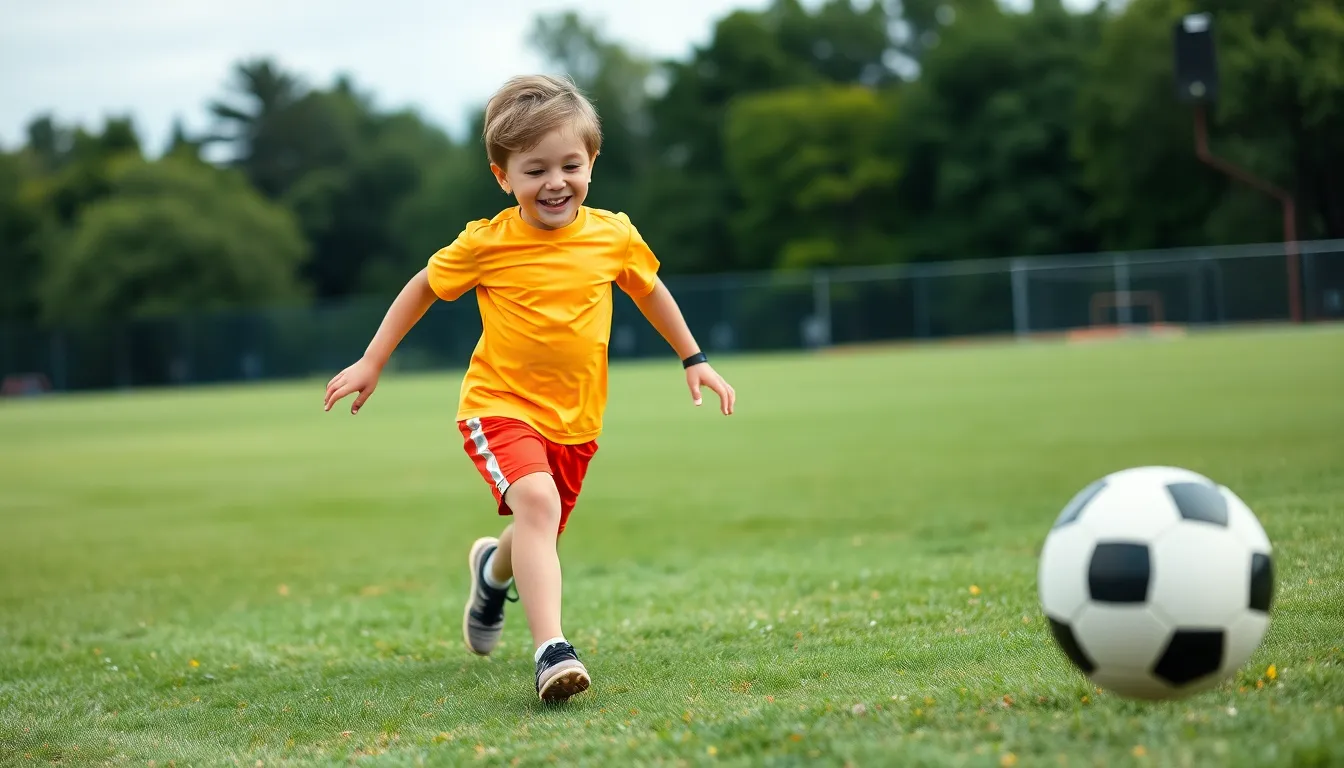Finding the right sport for kids can feel like searching for a needle in a haystack—if that haystack was also full of bouncing balls and excited children. With so many options available, it’s easy to get overwhelmed. But fear not! The world of sports offers a treasure trove of activities that not only keep kids active but also help them make friends, build confidence, and unleash their inner champions.
Table of Contents
TogglePopular Team Sports
Team sports offer kids a great way to connect, compete, and collaborate. Engaging in these activities often enhances physical fitness, teamwork, and social skills.
Soccer
Soccer remains one of the most popular sports for children. The game emphasizes endurance, agility, and strategy. Kids learn essential skills like dribbling, passing, and teamwork while enjoying a fast-paced environment. Many leagues cater to various age groups, allowing kids to participate at a level that suits their abilities. Additionally, soccer promotes cardiovascular health and coordination. With practice and motivation, young players can develop a lifelong love for the sport.
Basketball
Basketball is another favored sport among children. It supports physical fitness through running, jumping, and quick movements. Young athletes develop skills such as shooting, dribbling, and passing. Practicing regularly improves hand-eye coordination and stamina. Local teams often provide a supportive environment for kids to learn fundamentals and enhance their skills. Participating in basketball fosters teamwork and communication, essential qualities useful in many aspects of life.
Baseball
Baseball captures the interest of many young athletes. The sport builds skills like hitting, throwing, and base running, offering a balanced mix of physical activity and strategy. Players develop patience and focus as they learn to read the game and anticipate opponents’ moves. Baseball leagues typically accommodate various age ranges, ensuring everyone can join regardless of skill level. A sense of community often surrounds local teams, creating lasting friendships and memories for young players while promoting fair play and sportsmanship.
Individual Sports

Individual sports offer children an opportunity to focus on personal skill development while enjoying physical activity. These sports promote self-discipline and resilience, allowing kids to pursue goals at their own pace.
Swimming
Swimming engages kids in a full-body workout while enhancing cardiovascular health. This sport develops strength, flexibility, and breath control, aiding kids in building endurance. Competitive swimming allows children to participate in events, ranging from freestyle sprints to longer distances. Skills acquired in swimming translate to water safety, an essential life ability. Local swim teams provide a supportive environment, fostering friendships and teamwork while emphasizing individual progress.
Tennis
Tennis combines agility and strategy, making it an excellent choice for kids. Players develop hand-eye coordination and quick decision-making skills through rallies and matches. Opportunities abound for playing singles or doubles, promoting social interaction and teamwork. Kids gain physical benefits, including improved cardiovascular fitness and muscle strength. Tennis clubs often offer lessons and competitions, encouraging kids to pursue their interests and refine their skills in a structured setting.
Gymnastics
Gymnastics focuses on flexibility, strength, and balance, appealing to many children. Participants learn various techniques, from floor exercises to apparatus routines like bars and beams. Skill progression fosters determination and confidence, as children achieve new levels of difficulty. Gymnastics programs often emphasize discipline, enabling kids to set and reach personal goals while encouraging them to perform in front of others. This supportive atmosphere aids in forming lasting friendships among young athletes.
Outdoor Sports
Outdoor sports provide kids with fresh air and excitement while promoting physical fitness. Engaging in activities like hiking, cycling, and skateboarding fosters teamwork, coordination, and confidence.
Hiking
Hiking offers children excellent exposure to nature and the opportunity to explore new trails. Kids build endurance and strength while discovering diverse environments and wildlife. Group hikes create strong bonds with peers and family, enhancing social skills. Safety precautions, such as staying on marked paths and wearing proper footwear, ensure a fun experience. Combining physical activity with adventure, hiking cultivates a love for the outdoors.
Cycling
Cycling promotes cardiovascular fitness and balance while encouraging independence. Kids can cycle in parks, neighborhoods, or trails, making it a versatile activity. Engaging in group rides teaches cooperation and respect for traffic rules. Cycling also improves leg strength and coordination through various terrains. Parents can enhance the experience by ensuring that kids wear helmets and follow safety guidelines.
Skateboarding
Skateboarding combines physical activity with creativity and self-expression. This sport enhances balance, coordination, and concentration as kids learn new tricks and maneuvers. Whether at a skatepark or in the driveway, skateboarding encourages social interaction among peers. Safety gear, including helmets and pads, reduces injury risks while enhancing confidence. Through practice and perseverance, kids develop resilience and a sense of accomplishment.
Indoor Sports
Indoor sports provide children with opportunities for physical fitness, skill development, and social interaction, regardless of weather conditions.
Martial Arts
Martial arts, including karate and taekwondo, teach discipline, respect, and self-defense. Participants improve coordination while gaining confidence through progression in techniques. Many martial arts classes emphasize teamwork, encouraging students to support each other in their journeys. Classes often create a community that fosters friendships among participants.
Dance
Dance offers various styles such as ballet, hip-hop, and jazz, allowing kids to express creativity and improve coordination. Engaging in dance classes enhances physical fitness while promoting rhythm and balance. Collaborating in group performances cultivates teamwork and communication skills. Dance also helps children understand the importance of practice, perseverance, and dedication.
Table Tennis
Table tennis is a fast-paced indoor sport that boosts hand-eye coordination and reflexes. Players develop strategic thinking while learning tactics for winning matches. The sport requires minimal space and equipment, making it easily accessible. Social interaction occurs as kids participate in friendly competitions, enhancing their enjoyment. Engaging in table tennis also promotes focus and concentration.
Benefits of Sports for Kids
Engaging in sports offers numerous advantages for children, impacting their physical health, social skills, and emotional well-being.
Physical Health
Sports enhance physical health in several ways. Regular participation in activities, such as soccer and swimming, improves cardiovascular fitness and builds strength. Children develop coordination and flexibility through sports like gymnastics and dance. Exercise contributes to maintaining a healthy weight, reducing obesity risks. Activities encourage overall activity levels, leading to stronger bones and muscles. Organizing sports events also promotes active lifestyles in communities.
Social Skills
Participation in sports fosters valuable social skills. Team-based activities, such as basketball and baseball, teach children cooperation and communication. Kids learn to work together towards common goals, cultivating teamwork and collaboration. Friendships form through shared experiences, creating bonds that last beyond the playing field. Engaging in individual sports, like tennis, allows for interaction with peers, enhancing social confidence. Supporting one another in competitions builds empathy and respect.
Emotional Well-being
Involvement in sports significantly boosts emotional well-being. Successes and achievements in athletics promote self-esteem and confidence. Children learn to cope with both victories and losses, developing resilience and adaptability. Sports provide a constructive outlet for stress and anxiety. Regular physical activity stimulates the release of endorphins, improving mood. Creating strong friendships through sports nurtures a sense of belonging and community, further supporting emotional health.
Finding the right sport for kids can be a journey filled with exploration and discovery. Each sport offers unique benefits that contribute to a child’s physical health and social development. Whether it’s the teamwork found in soccer or the individual growth experienced in swimming, the right sport can ignite a passion for activity.
Encouraging children to participate in sports not only fosters essential life skills but also creates lasting memories and friendships. With so many options available, parents can help their children find the perfect fit that aligns with their interests and abilities. Ultimately, engaging in sports lays the foundation for a healthy and active lifestyle that can last a lifetime.



